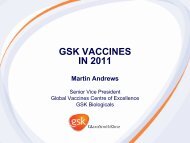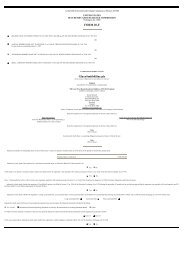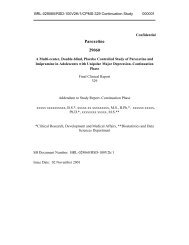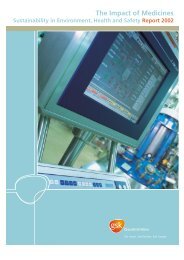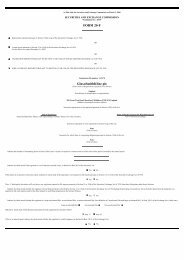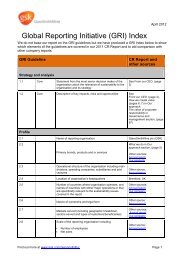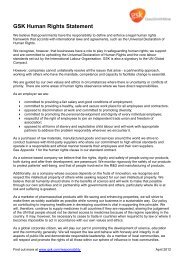GSK Annual Report 2002
GSK Annual Report 2002
GSK Annual Report 2002
Create successful ePaper yourself
Turn your PDF publications into a flip-book with our unique Google optimized e-Paper software.
Funding, maturity and counterparty risk<br />
The Group invests centrally managed liquid assets primarily in<br />
Government bonds and short-term corporate debt instruments<br />
with a minimum short-term credit rating of A-1/P-1 from Standard<br />
and Poor’s and Moody’s Investors’ Services respectively. The Group<br />
manages its net borrowing requirement through a portfolio of<br />
long and medium-term borrowings, including bonds, together<br />
with short-term finance under the US dollar commercial paper<br />
programme. In <strong>2002</strong>, a £500 million, 4.875 per cent coupon bond<br />
and two US dollar denominated, floating rate bonds totalling<br />
$495 million were issued under the European Medium Term Note<br />
programme. The Group also raised $500 million floating rate debt<br />
through a private financing arrangement.<br />
The Group’s medium-term borrowings mature at dates between<br />
2004 and 2008, the private financing matures in 2032, and the<br />
long-dated sterling bond matures in 2033. The private financing<br />
may be redeemed by GlaxoSmithKline at any time and, in<br />
particular, in the event of any accelerating event that would<br />
increase the cost of funding for the Group. The Group also has<br />
outstanding $500 million of Flexible Auction Market Preferred<br />
Stock (Flex AMPS) and $400 million of Auction Rate Preference<br />
Stock (ARPS), originally issued in 1996. $250 million of the Flex<br />
AMPS may be redeemed by GlaxoSmithKline at any time after<br />
July 2003. The remainder of the Flex AMPS and the ARPS may<br />
be redeemed by GlaxoSmithKline at any time.<br />
GlaxoSmithKline’s long-term debt rating is AA from Standard and<br />
Poor’s and Aa2 from Moody’s Investors’ Services. The agencies’<br />
short-term rating for paper issued under the Group’s commercial<br />
paper programme is A-1+ and P-1 respectively.<br />
Foreign exchange risk management<br />
In GlaxoSmithKline, foreign currency transaction exposure arising<br />
on normal trade flows both in respect of external and intra-Group<br />
trade is not hedged. GlaxoSmithKline’s policy is to minimise the<br />
exposure of overseas operating subsidiaries to transaction risk<br />
by matching local currency income with local currency costs.<br />
For this purpose, intra-Group trading transactions are matched<br />
centrally and intra-Group payment terms are managed to reduce<br />
risk. Exceptional foreign currency cash flows are hedged selectively<br />
under the management of Corporate Treasury.<br />
A significant proportion of Group borrowings, including the<br />
commercial paper programme, is in US dollars, to benefit from<br />
the liquidity of US dollar denominated capital markets. Certain of<br />
these and other borrowings are swapped into other currencies as<br />
required for Group purposes. The Group seeks to denominate<br />
borrowings in the currencies of its principal overseas assets.<br />
Borrowings denominated in, or swapped into, foreign currencies<br />
which match investments in overseas Group assets are treated as a<br />
hedge against the relevant net assets.<br />
Based on the composition of net debt at 31st December <strong>2002</strong> a<br />
10 per cent appreciation in sterling against major currencies would<br />
result in a reduction in the Group’s net debt of approximately<br />
£145 million. A 10 per cent weakening in sterling against major<br />
currencies would result in an increase in the Group’s net debt of<br />
approximately £177 million.<br />
Interest rate risk management<br />
GlaxoSmithKline’s policy on interest rate risk management requires<br />
that the amount of net borrowings at fixed rates increases with<br />
the ratio of forecast net interest payable to trading profit.<br />
Operating and financial review and prospects GlaxoSmithKline 63<br />
The Group uses a limited number of interest rate swaps to<br />
redenominate external borrowings into the interest rate coupon<br />
required for Group purposes. The duration of these swaps matches<br />
the duration of the principal instruments. All interest rate derivative<br />
instruments are accounted for as hedges of the relevant assets or<br />
liabilities.<br />
The Group manages centrally the short-term cash surpluses or<br />
borrowing requirements of subsidiary companies and uses forward<br />
contracts to hedge future repayments back into originating<br />
currency.<br />
Sensitivity analysis considers the sensitivity of the Group’s net debt<br />
to hypothetical changes in market rates and assumes that all other<br />
variables remain constant. Based on the composition of net debt at<br />
31st December <strong>2002</strong> a one percentage point (100 basis points)<br />
increase or decrease in average interest rates would result in a<br />
negligible change in the Group’s annual interest expense.<br />
Equity risk management<br />
Equity investments classified as current assets are available for sale<br />
and the Group manages disposals to meet overall business<br />
requirements as they arise. The Group regularly monitors the value<br />
of its equity investments and only enters into hedges selectively<br />
with the approval of the Board.<br />
Financial assets and liabilities<br />
An analysis of net debt is given in Note 25 to the Financial<br />
statements, ‘Net debt’. An analysis of financial assets and liabilities<br />
at carrying value and fair value and a reconciliation to net debt are<br />
given in Note 32 to the Financial statements, ‘Financial instruments<br />
and related disclosures’, together with a discussion of derivative<br />
financial instruments and quantitative disclosures about market risk in<br />
accordance with the requirements of Financial <strong>Report</strong>ing Standard 13.<br />
The Group continues to benefit from strong positive cash flow.<br />
Group net debt would have decreased significantly in the year to<br />
31st December <strong>2002</strong>, except for the Group’s purchase of its own<br />
shares in the market of £2,220 million.<br />
The financial assets and liabilities at 31st December <strong>2002</strong> are<br />
representative of the treasury policies and strategies of<br />
GlaxoSmithKline, applied consistently during the year. There were<br />
no significant changes in such policies throughout the year.<br />
ESOT share purchases and shares purchased for cancellation<br />
In <strong>2002</strong> the ESOTs did not make any market purchases of shares in<br />
GlaxoSmithKline plc (2001 – £795 million). The shares are held by<br />
the Trusts to satisfy future exercises of options and awards under<br />
the Group share option and award schemes. A proportion of the<br />
shares held by the Trusts are in respect of options where the rules<br />
of the scheme require the company to satisfy exercises through<br />
market purchases rather than the issue of new shares.<br />
The shares held by the Trusts are matched to options granted and<br />
diminish the dilutive effect of new share issues on shareholders'<br />
capital and earnings.<br />
At the <strong>2002</strong> <strong>Annual</strong> General Meeting, shareholders renewed<br />
approval for GlaxoSmithKline to make market purchases of its own<br />
shares. In September <strong>2002</strong>, the £4 billion share repurchase<br />
programme announced in October 2001 was completed. On<br />
23rd October <strong>2002</strong>, GlaxoSmithKline announced a further share<br />
repurchase programme of £4 billion. The exact amount and timing<br />
of future purchases will depend on market conditions and other<br />
factors. In <strong>2002</strong>, GlaxoSmithKline purchased 155.7 million shares<br />
for cancellation, at a total cost of £2,220 million.



